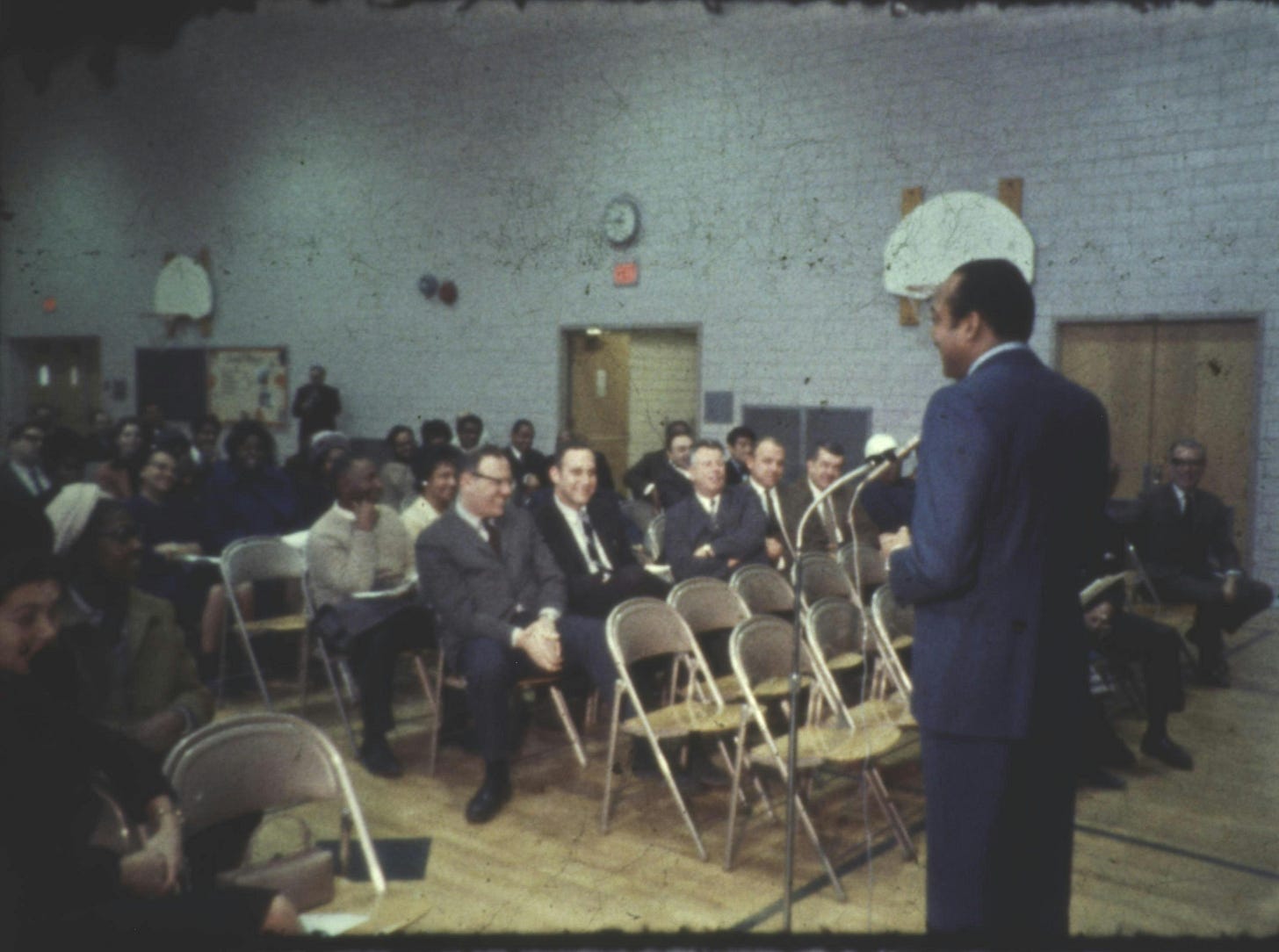In my late teens, I heard a man give a talk at a local civic meeting. Just in his early 30s himself, he was already a hot commodity on the keynote circuit. Ultimately, he became a profoundly successful motivational speaker, author, and businessman.
A student of communications myself and keenly interested in presentation styles, I don’t recall a single word of the man’s speech. I do remember thinking that his motivating message was the equivalent of “Brush your teeth twice a day to stave off halitosis, and get plenty of sleep.” To my mind, nothing he offered was novel, but his delivery was assertive and engaging. The audience lapped it up, standing at the end for an ovation.
I was nonplussed. In my mind, most anyone could have come up with a similar talk, including me. I learned, that day, that what someone says is often less important than how they say it. Charismatic leaders have a way of winning people over.

It’s not just the spoken word. The same phenomenon occurs with written pieces. I see how throngs flock to those who stick their points and give no quarter, and there are logical reasons.
First, thanks to our friend-or-foe hardwiring, our brains are biologically attracted to confidence while avoiding uncertainty. When we encounter someone who lacks assurance, their erratic eye contact or nervous word slips can be interpreted, subconsciously, as lack of trustworthiness, even dishonesty. Thus, we gravitate toward displays of authority.
Second, the world we live in is cacophonous. Having access to too much information means we are perpetually out of one loop or another, no matter how many bouncing banners or numbered notifications fly across our screens. Memes, sound bites, TL;DR—we crave simplification. Show up with an authoritative opinion, punctuate it with information that sounds like facts, add a compelling personal story, maybe a touch of humor or self-deprecation, and ding! You’ve got followers!
It’s nice to find our people. When we come across someone who affirms what we were already thinking, or half-thinking, or thinking about thinking, it’s reassuring. It’s as though they’re articulating everything we’ve been feeling but didn’t know how to say.
We notice others who also appreciate this leader. Look, there’s Ace from the gym, and Kristin from high school! It turns out we have mutual friends here, too. Heck, this is almost as good as a football game. Pass me that chicken bucket, wouldja? Go team!
Despite how right it all feels, there’s still something wrong with this kind of experience. It has a way of killing curiosity. When I align myself with one set of opinions, one collection of ideas, one like-minded group thinking like-minded thoughts, I no longer need to ask questions or challenge assumptions. We’re all already on the same page. When I’m with my people, I become unmotivated to learn about other people.
In the early 2000s, forecaster and scenario consultant, Paul Saffo, developed a decision-making framework that has relevance here. He advised holding strong opinions weakly.
“Having strong opinions gives you the capacity to reach conclusions quickly,” he wrote. “But holding them weakly allows you to discard them the moment you encounter conflicting evidence.”
We are increasingly inclined to adopt only half of this strategy. We’ve mastered the art of forming strong opinions, but rather than holding them loosely, we death grip those bad boys, build our identities around them, and label anyone with opposing perspectives as an idiot.
I wonder: Do they feel like idiots? Do you?
What would it require to reacquaint ourselves with nuance? Is everything as black and white as we are choosing to believe? What if we made gray great again? What if we set out, with purpose, to look for the middle ground. What if we replace criticism with curiosity?
What if we remember that for every story we tell ourselves about what is true for us, someone else has a different story that is equally true for them?
The man I heard speak all those years ago was Nido Qubein, president of High Point University. Today, he is a multi-millionaire. His is a story I have long loved to hate. Still, aside from a vague awareness that he’d immigrated to the U.S. with limited means and made money from being a savvy businessman and speaker, I knew almost nothing about him. I told myself he hadn’t done enough to deserve his success. Frankly, I wasn’t inclined to find out more about him until now.
Nido was the youngest of five children. His father died when he was six years old, so he and his siblings were raised by their mother. She had a fourth grade education and worked as a seamstress. At 17, Nido left the Middle East, on his own, to attend college in America. He barely spoke English and had less than $100 in his pocket.
I can’t say I am a fan of all the ways this man has made his fortunes, nor of how he has added his name to the many structures his money and influence have helped build in my hometown. But I don’t have to agree with everything to appreciate the obstacles he overcame to get where he is now, to see past my opinions long enough to consider his. He has shown no indication of nefarious intent, no record of corruption. He’s a guy who used hard work and inborn talent to rise above his past.
Allowing space in our minds for others to be equally entrenched, similarly siloed, and every bit as capable of failure or success as we ourselves are doesn’t force us to embrace opinions that don’t work for us. It doesn’t mean abandoning our convictions. What it means is resisting the urge to “other” others. It means disagreeing respectfully. It means acknowledging that we might not know everything there is to know. It means trying to learn. It means being willing to show up in the in-between long enough to meet another person there.
Nido credits his mother for giving him the gift of awareness.
If we all committed to giving ourselves and others the same gift, I wonder what kind of future we could build?
~Elizabeth
For those enjoying the audio today, the sound of the trash truck leaving the neighborhood at the end somehow seems fitting! 😂
Thanks in advance for taking a moment to like, share, and restack this post to help me reach a wider audience.
If it hasn’t hit you already, the great paradox here is that I’ve expressed a strong opinion about the risk of strong opinions. #itscomplicated I welcome your feedback, your civil discourse, your discoveries, your messy middle.
What makes you curious? Which of your identities do you value most? What are you still learning? If you are a U.S. citizen, will you be participating in the upcoming election?
You can register to vote or update your registration here, and you can also confirm that your voting status is active. It’s best to not make assumptions on that as there are reports of some folks being marked inactive without their knowledge.
These essays are free, and I want to keep it that way. Everyone should have access to supportive ideas, regardless of means. If you can invest just $5 a month, you will help sustain the ongoing creative effort and let me know you appreciate the work I’m doing. Shoutouts to Elaine, Robert, G. Warner, and Darrell for their recent support!
Paid subscription options can be accessed here, and one-time contributions can be made here. Any amount is sincerely appreciated.





I agree that #itscomplicated! I grew up in a bipartisan household, with a bipartisan extended family, which is to say that I grew up hearing diverse perspectives and with a model of people loving each other despite holding different views on all manner of issues. What made all of that work, I think, is that everyone had similar core wants for us as a country and society. They just had different ideas about how to achieve them. They all believed in democracy, fairness, acceptance of difference, and equality, so much so that those things were a given. I think there's too much evidence that such is no longer the case for too many of us. I accept the idea that two people can hold different, valid truths--but some "truths" actually aren't true at all. I believe in engaging in an exchange of ideas when another person and I are having the same conversation, working toward the same general ends, but if the other person is trying to establish an authoritarian government by undermining democracy and they are working toward that on the basis of disinformation, that's a whole other ball of wax. Too often, we aren't having the same conversation or playing the same game. Having said all that, I will acknowledge that a car trip across our country last year shifted my perspective and understanding of those who have embraced a path I find abhorrent and just plain wrong. I understand why they have lost a kind of faith I'm still able to have because life is so different for me, where I live. I don't know if we need to replace criticism with curiosity so much as empathy. Probably, ideally, both. Appreciate the opportunity to wrestle a bit with these ideas.
I wish I had the need/desire to mix with those who have alternate opinions, but I'm really not sure I do.
Let me explain. For three years, I was part of a very intensive campaign to disallow farmed salmon pens on our beautiful coastline. Water that belongs to the people of our state, where unique species of seaweeds and creatures exist. We were already aware of the ecological damage caused by ocean salmon farming overseas. It was not what we wanted on our prisitine coast.
We worked hard, we spoke to politicians and people daily. We were continually vilified and trolled by the companies who wanted to farm. It was exhausting and yet we managed to organise a flotilla of 3000 boats on the Derwent River and pulled up next to our waterside Parliament House.
We were ignored. The fish farms continue in a powerful self-regulatory position.
Why would I want to socialise with or be a part of a group of self-interested money makers when we have global evidence of what their interest does? It's burned me completely. I care so much about our environment and the heritage for my grandson, so I can't tolerate the slash and burn motives of business.
This also applies to other situations that I'm passionate about. So much so, that whilst I may state my case amongst v. close friends, I'll no longer waste the time to mix with those of other views. I'll read their views online, disagree in my head but I won't mix with them in real life. I don't want to be sad and uncomfortable with the time I have left.
But I understand your POV.